Clarification: I have (most unwittingly) done the poet a dis-service by labeling her a “holocaust survivor”. While there is no doubt that Rivka Basman Ben-Haim is a holocaust survivor, and that this experience lurks under the surface at all times, it does not and should not define her. Any one who will read the articles in the following posts, listen to the recordings below, and/or read the texts below, will see that Rivka Basman Ben-Haim has done many things since those years. Her poems are about eveything and anything, and are by no means limited to this one theme.
This winter Rivka Basman Ben-Haim published a new book called Liederheym,
Poem(s)-home. Below is its front cover
Front Cover Rivka Basman Ben-Hayim’s New Book 2013
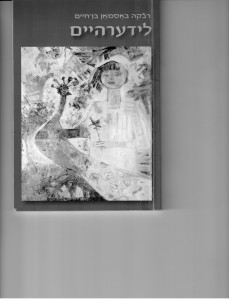
Below is a photo of Rivka reading from her new book at the book launching.
(Photo- courtesy of Bella Bryks-Klein):
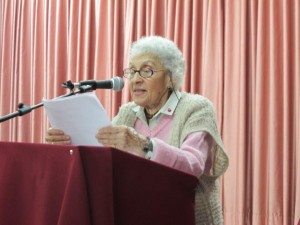
Here are 10 poems from that book- first a recording, then the Yiddish and the English. On some screens, the English version is not formatted properly. If you do not get a properly formatted version for theEnglish translation, click on the hyperlink to get Word file. If the file still does not appearproperly formatted, you maybe using the Chrome browser. In that case, use Internet Explorer as your browser, and all will be well.
liederheym page 8 Di Kroyveshaft -recording
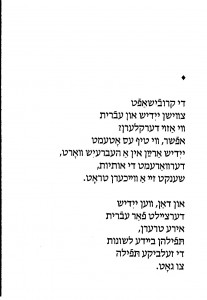 How to explain The intimacy Between Yiddish and Hebrew? Perhaps the way Yiddish breathes deeply Into a Hebrew word, Warms up the letters, Gives them a softer step.
How to explain The intimacy Between Yiddish and Hebrew? Perhaps the way Yiddish breathes deeply Into a Hebrew word, Warms up the letters, Gives them a softer step.
And then when Yiddish Tells Hebrew about Her tears- Both languages pray The identical prayer To God.
If the English translation above was not properly formatted, click below for a Word document:
Liederheym page 8 English translation
liederheym page 10 Tsu Zikh– To Myself- recording
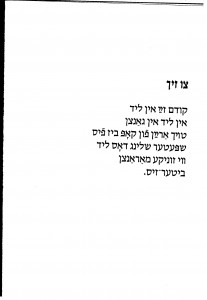 First be in the poem Entirely within the poem Immersed from head to feet Then swallow the poem Like sunny oranges Bitter-sweet.
First be in the poem Entirely within the poem Immersed from head to feet Then swallow the poem Like sunny oranges Bitter-sweet.
If the English translation above was not properly formatted, click below for a Word document
Liederheym page 10 English translation
liederheym page 12 Di Shtekhers The Thorns- recording
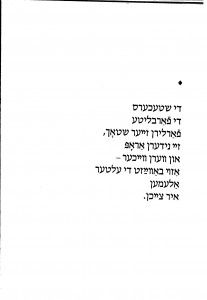 The thorns That’ve withered Lose their sharpness, They shrink And they soften- So old age shows Everyone Its mark.
The thorns That’ve withered Lose their sharpness, They shrink And they soften- So old age shows Everyone Its mark.
If the English translation above was not properly formatted, click below for a Word document:
Liederheym page 12– English translation
liederheym page 14 Mit Lider fun Yung Yisroel With Poems of “Yung Yisroel”- recording
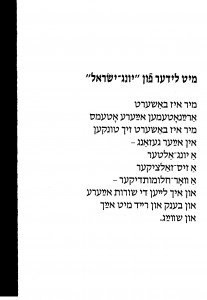 I was fated To inhale your breath I was fated to sink Into your song- An old-young A salty-sweet A true-dream-like And I read your verse And I long-for and speak to you And am silent.
I was fated To inhale your breath I was fated to sink Into your song- An old-young A salty-sweet A true-dream-like And I read your verse And I long-for and speak to you And am silent.
If the English translation above was not properly formatted, click below for a Word document:
Liederheym page 14 English
liederheym page 15 Nokhn Shturm After the Storm recording
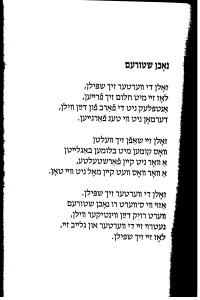
Let the words play Let them be happy with a dream, Don’t show them the color of your will, Don’t remember past days.
Let them create worlds Which come with flowers to greet An unmasked reality, A reality that’ll never feel pained.
Let the words play As calm follows a storm Your wind-swept will becomes calm Trust those words and believe them. Let them play.
If the English translation above was not properly formatted, click below for a Word document:
Liederheym page 15 English
liederheym page 17 A Vort A Word -recording
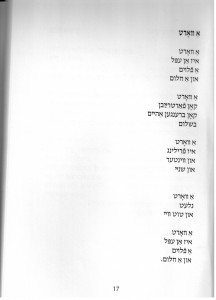 A word Is an apple A plum And a dream.
A word Is an apple A plum And a dream.
A word can drive-out And bring home In peace.
A word Is spring And winter And snow.
A word Strokes And hurts.
A word Is an apple A plum And a dream.
If the English translation above was not properly formatted, click below for a Word document:
Liederheym page 17 English translation
liederheym page 19 Di Goldene Keyt recording
The “Golden Chain”
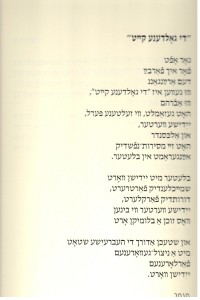 It often happens That I ride by The entrance Of the former “Golden Chain” Where Avrohom Gathered Yiddish words As rare pearls, And Alexander With great dedication Arranged them on the pages.
It often happens That I ride by The entrance Of the former “Golden Chain” Where Avrohom Gathered Yiddish words As rare pearls, And Alexander With great dedication Arranged them on the pages.
Pages of Yiddish words Smiling and teary Thought-through by generations, Yiddish words like bees Which seek a flowering spot.
And on-the-way sting the Hebrew city With a reclaimed, Lost Yiddish word.
If the English translation above was not properly formatted, click below for a Word document:
Liederheym page 19 English translation
liederheym page 22 In Veg On the Road- recording
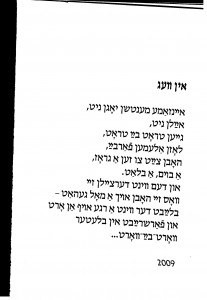 Lonely people don’t rush, Don’t hurry, They walk step-by-step, Let all pass them by, They’ve time to see a blade of grass A tree, a leaf. And they tell the wind What they once had- So the wind lingers a moment And writes it down on the leaves Word for word….
Lonely people don’t rush, Don’t hurry, They walk step-by-step, Let all pass them by, They’ve time to see a blade of grass A tree, a leaf. And they tell the wind What they once had- So the wind lingers a moment And writes it down on the leaves Word for word….
If the English translation above was not properly formatted, click below for a Word document:
Liederheym page 22 English translation
liederheym page 24 A Hunt Hot Mikh Arumgekukt A Dog Looked Me Over – recording:
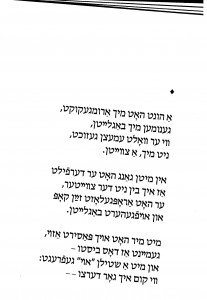 A dog looked me over Began to accompany me As though he were searching Not for me but someone else.
A dog looked me over Began to accompany me As though he were searching Not for me but someone else.
While walking he sensed I was not that other So he lowered his head And stopped accompanying.
That same thing happened to me I thought it was you And with a quiet “oy” asked How exactly do I get to-
If the English translation above was not properly formatted, click below for a Word document:
Liederheym page 24 English translation
liederheym page 50 In Shpigl In the Mirror- recording
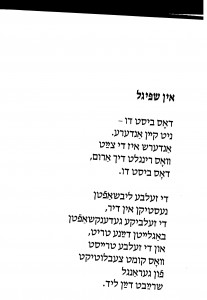 You are yourself- No one else. What’s different is the time Which encircles you, This is you.
You are yourself- No one else. What’s different is the time Which encircles you, This is you.
The same loves Nest in you The same thoughts Accompany your step And the same consolation Which comes bloodied From the struggle Writes your poem.
If the English translation above was not properly formatted, click below for a Word document:
Liederheym page 50 English translation
liederheym page 17 A Vort A Word














